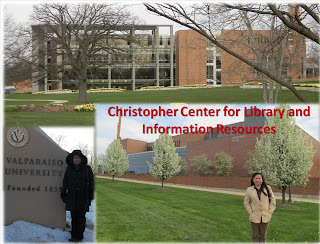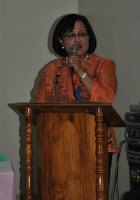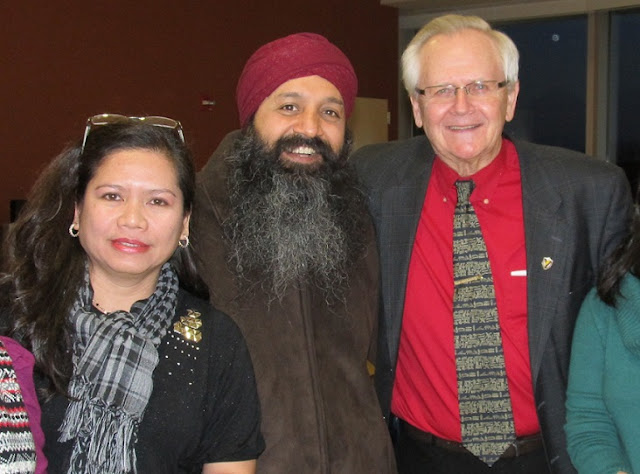"Developments in information technology that change teaching, learning, and research"
One of the current issues and trends in higher education is the development of information communication technologies including emphasis on partnerships, alliances and networking. These rapid and intense technological advances have bigger impact in enhancing education and have caused profound growth and diversity in many different fields of studies around the globe. One of the significantly valuable service areas in an institution of higher learning that incorporate the application of information technology into the understanding of the internet, world wide web, online databases and other services is the library and information center. Librarians then have key new roles to play in support to students’ and teachers’ information interaction and environments.
It is now a must for libraries and information centers to embrace a diverse combination of print, nonprint and electronic materials, online and licensed databases, research guides and finding aids. Thus, make these areas learner-focused environments where faculty and students can access information and learning resources to make a positive change in their teaching, learning and research endeavors. Prof. Rick AmRhein, Dean, Library Services of Valparaiso University said, “We wanted to break the mold of traditional libraries, and the Christopher Center’s design focuses on encouraging group work, providing an inviting learning space and mixing books and other traditional materials with electronic resources”.
My experiences at Valparaiso University from January - May 2011 gave me new outlook and perspective of the library work and gave me idea to put the usefulness of the added-value library services in a higher level. With what I learned, I will let the academic constituents in my home institution to also recognize and maximize the use of the library as it supports to instruction, research and in their pursuit for knowledge and wisdom in general.
To maintain the role of the library as an intellectual center of the academic institution, it is very important and necessary to redesign the older library and create new learning spaces to adopt and support the changing needs of the curricular offerings, the degree standards, the accreditation requirements and the other needs of faculty and students. I learned that, with the proliferation of new technologies, the concept of Information Commons (IC) or Learning Commons should be embraced to nurture and trigger faculty and students’ intellectual growth. This new learning paradigm, which is putting the traditional resources and the new technologies together should be designed in an array of services and tools to choose from, including service delivery around an integrated digital environment. The availability of research and computing consultation and assistance by IT professionals, librarians and public services library staff alike are equally important too. An integrated service facility embracing both the information technology and information literacy provide more meaning to the importance and existence of libraries. According to my mentor “libraries are for discovery, learning and human interaction”, thus the concept of information commons (IC) or learning commons primarily support and boost the instruction and collaborative learning within an academic institution. The multimedia and digital media devices are powerful tools being used by professors for teaching and learning in and outside of the classrooms.
To maintain the role of the library as an intellectual center of the academic institution, it is very important and necessary to redesign the older library and create new learning spaces to adopt and support the changing needs of the curricular offerings, the degree standards, the accreditation requirements and the other needs of faculty and students. I learned that, with the proliferation of new technologies, the concept of Information Commons (IC) or Learning Commons should be embraced to nurture and trigger faculty and students’ intellectual growth. This new learning paradigm, which is putting the traditional resources and the new technologies together should be designed in an array of services and tools to choose from, including service delivery around an integrated digital environment. The availability of research and computing consultation and assistance by IT professionals, librarians and public services library staff alike are equally important too. An integrated service facility embracing both the information technology and information literacy provide more meaning to the importance and existence of libraries. According to my mentor “libraries are for discovery, learning and human interaction”, thus the concept of information commons (IC) or learning commons primarily support and boost the instruction and collaborative learning within an academic institution. The multimedia and digital media devices are powerful tools being used by professors for teaching and learning in and outside of the classrooms.
Leaders of the academic institutions must be mindful of the fact that there is an increasing demand for electronic searching capabilities, increase demands for access to machine-readable scholarly texts and use of network discussion groups for scholarly communication. The leaders of higher educational institutions also need to prepare their students for careers by providing better library and information services and learning environments. A kind of learning environment that can design, build and manage new digital information systems. It should be a learning environment that would support the goals and objectives of the institution and the curricular offerings to enrich instruction. Libraries of today provide patrons with access to more updated electronic resources such as CDROMS, DVDs, VCDs and online databases and services more than the shelves with books or print versions.
Let me enumerate several programs and services of the Christopher Center for Library and Information Resources at Valparaiso University that interest me most. This includes the digital media initiative. This initiative is a new program of Valparaiso University Library that aims to build an online database of as much as possible providing full-text of all the books, research outputs and other publications of faculty, staff and students in the university. This online program will eventually become available and accessible for teaching, learning and research via wired or wireless access to the academic constituents and beyond the campus in both limited and full access.
Let me enumerate several programs and services of the Christopher Center for Library and Information Resources at Valparaiso University that interest me most. This includes the digital media initiative. This initiative is a new program of Valparaiso University Library that aims to build an online database of as much as possible providing full-text of all the books, research outputs and other publications of faculty, staff and students in the university. This online program will eventually become available and accessible for teaching, learning and research via wired or wireless access to the academic constituents and beyond the campus in both limited and full access.
The provision of IT assistance adjacent to the amenities like coffee bar or cafe is to relax the atmosphere and make the library a privileged destination outside the classroom. This could be a place where faculty and students complete their academic project with the aid of technological and information capabilities. The idea of providing a one-stop destination for library clients likely be very convenient considering the time and space.
The Library Instruction Services Program provides a course-integrated instruction that enable students to know and learn about how and what printed, non-printed and electronic resources can be of use in support to their studies. Other best practices in colleges and universities in the US include the use of a space saver compact shelves and a charging station for laptops and for other electronic materials. The Automated Processing had enhanced integrated library system and eased the labor of detail-intensive and repetitive works of librarians.
Emphasis on partnerships, alliances and networking
A network of alliances or relationships that extend beyond the institution could enhance the library services. Libraries must be proficient in building new networks to aid research process such as network of people, network of resources and building connections and linkages.
 We, as leaders must be aware that research and researchers are increasing, and the amount of published material is increasing too. Because of these concerns, digitization of such materials and variety of formats challenged libraries with limited budgets. We also have to understand that “no library is self-sufficient thus co-operative approaches, interlibrary cooperation/collaboration and electronic networks are necessary”. In order to continue providing effective physical access to documents and other reading materials, libraries must increase cooperation and resource sharing to overcome problems of access, communication failures and funding problems. Let us foresee the opportunities for sharing information resources via electronic networks. The Interlibrary Loan (ILL) service is very valuable considering our institution’s financial limitations.
We, as leaders must be aware that research and researchers are increasing, and the amount of published material is increasing too. Because of these concerns, digitization of such materials and variety of formats challenged libraries with limited budgets. We also have to understand that “no library is self-sufficient thus co-operative approaches, interlibrary cooperation/collaboration and electronic networks are necessary”. In order to continue providing effective physical access to documents and other reading materials, libraries must increase cooperation and resource sharing to overcome problems of access, communication failures and funding problems. Let us foresee the opportunities for sharing information resources via electronic networks. The Interlibrary Loan (ILL) service is very valuable considering our institution’s financial limitations.
Conclusion
A network of alliances or relationships that extend beyond the institution could enhance the library services. Libraries must be proficient in building new networks to aid research process such as network of people, network of resources and building connections and linkages.
 We, as leaders must be aware that research and researchers are increasing, and the amount of published material is increasing too. Because of these concerns, digitization of such materials and variety of formats challenged libraries with limited budgets. We also have to understand that “no library is self-sufficient thus co-operative approaches, interlibrary cooperation/collaboration and electronic networks are necessary”. In order to continue providing effective physical access to documents and other reading materials, libraries must increase cooperation and resource sharing to overcome problems of access, communication failures and funding problems. Let us foresee the opportunities for sharing information resources via electronic networks. The Interlibrary Loan (ILL) service is very valuable considering our institution’s financial limitations.
We, as leaders must be aware that research and researchers are increasing, and the amount of published material is increasing too. Because of these concerns, digitization of such materials and variety of formats challenged libraries with limited budgets. We also have to understand that “no library is self-sufficient thus co-operative approaches, interlibrary cooperation/collaboration and electronic networks are necessary”. In order to continue providing effective physical access to documents and other reading materials, libraries must increase cooperation and resource sharing to overcome problems of access, communication failures and funding problems. Let us foresee the opportunities for sharing information resources via electronic networks. The Interlibrary Loan (ILL) service is very valuable considering our institution’s financial limitations. Conclusion
I believe that the Higher Educational Institutions (HEIs) do not lack visions to improve access and better dissemination of information through the information technology. What lies behind it is the lack of efficient means to realize them. To meet users' ever-increasing demands - libraries must acquire as many appropriate full text resources as quickly as possible, and make these resources easy to use. Technologies can then become networking partners in a rational system, even in traditional fields. Therefore, the library place evolves into something where readers access both traditional and untraditional materials, in both traditional and untraditional ways, both in physical and virtual contexts.
If our efforts focus on developing resources that support learning of all kinds and if we reveal the value that we create and provide for the constituents we serve, then we will succeed in fulfilling the promise to create and sustain a world of learners.
If our efforts focus on developing resources that support learning of all kinds and if we reveal the value that we create and provide for the constituents we serve, then we will succeed in fulfilling the promise to create and sustain a world of learners.
Sources:
Acquiring and Managing Electronic Journals. ERIC Digest. (n.d.). Retrieved from
http://www.ericdigests.org/2003-3/journals.htm
Quinones, Sandra Lyn. Mindanao Alliance of Educators of Library & Information Science
2nd Conference on the Teaching of Library & Information Science with the theme: “Exploring Content, Collaboration and Pedagogies in Teaching LIS: Emerging Issues” Davao City. May 15-16, 2008.
http://www.valpo.edu/news/news.php?releaseId=3609.
Presented by Sandra Lyn Quinones during the Leadership Seminar sponsored by the United Board for Christian Higher Education in Asia for the United Board Fellows Program, hosted by Payap University, Chiang Mai, Thailand on July 18-23, 2011.
























